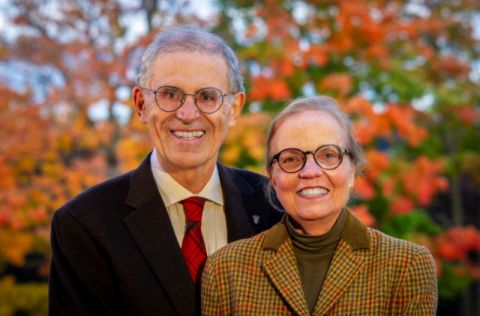
For retired Quebec Superior Court Justice Mark Peacock, Law’74, one legal document more than any other is at the core of Canada’s meaning. “For me, both when I was a practitioner and a judge, that document was the Canadian Charter of Rights and Freedoms,” he says. “I think it encapsulates what this country is all about, particularly its provisions that deal with equality, minority rights, and linguistic rights.”
That belief, plus an abiding sense of loyalty to Queen’s Law, has prompted Peacock, along with his wife, Dru Spencer, to give back to the school by establishing and endowing the Honourable Mark G. Peacock Scholarship in Constitutional Law, which recognizes excellence in Charter studies.
Queen’s Law initiates all students into Charter studies with the first-year constitutional law course and follows up with advanced upper-year electives. The Peacock Scholarship will encourage students to graduate well-equipped to meet the challenges of dealing with the increasingly complex range of Charter cases that the former judge sees arising.
“Queen’s Law has always had great strength in the study of public law, and the faculty currently includes two of this country’s leading Charter scholars: Dean Mark Walters and Professor Grégoire Webber,” says Peacock. “Dru and I hope that the scholarship we’ve established will build on that foundation and will help to get students really interested in the Charter.”
Explains Dru Spencer, “This scholarship is our way of giving back to Queen’s Law because Mark’s student years influenced him so positively and so many of our best friends are people he met at law school. He has always considered the Charter vital to all Canadians.”
Peacock seconds his wife’s words and applauds the fact the Charter spells out every Canadian’s constitutional rights in specific language, yet it is very much a “living, breathing” document; he has a seasoned jurist’s appreciation of the merits of codified law.
He also has a civil law degree from Laval and an LLM from the London School of Economics and practised in Montreal and Ottawa for 25 years before his 2007 appointment to the bench – the first Queen’s Law graduate to serve on Quebec’s Superior Court.
“The Charter is a code,” he says. “It’s written in simple language that can be read on a variety of levels and understood by the average Canadian. This is important because there isn’t anyone in this country who at some point won’t be impacted by or have an interest in what the Charter says.”
By Ken Cuthbertson